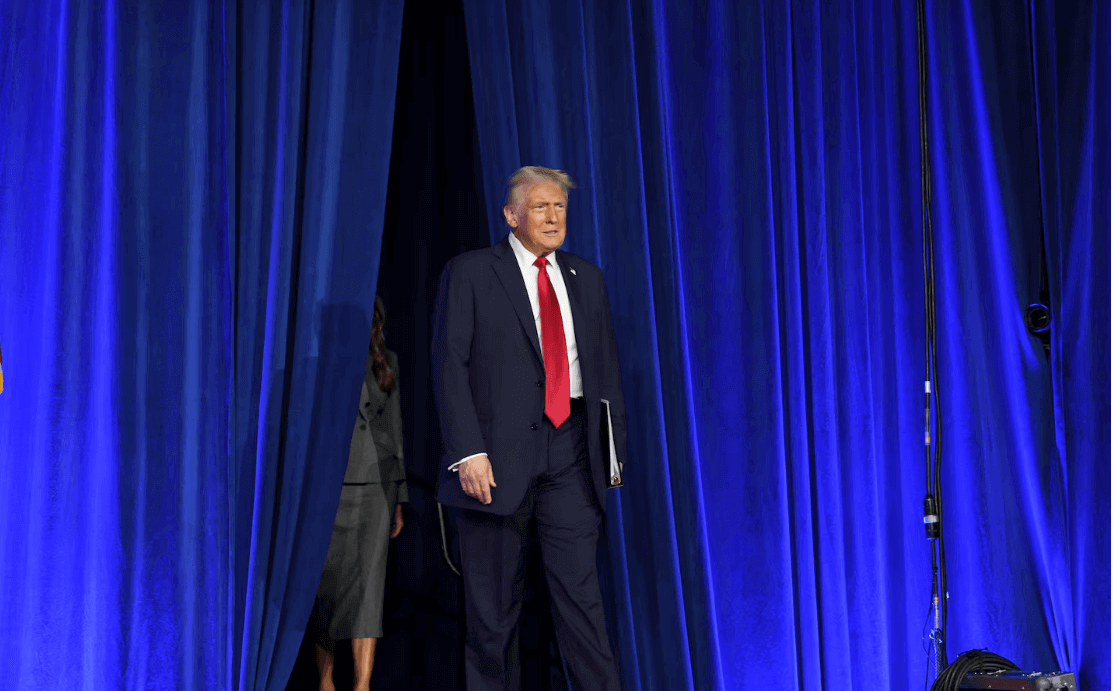特朗普发出“重大转变”信号,震惊华盛顿建制派

【中美创新时报2024 年 11 月 18 日编译讯】(记者温友平编译)不知何故,混乱还不足以掩盖它。动乱可能更近了。革命也许。在再次当选后不到两周的时间里,唐纳德·特朗普开始了一场新的运动,以摧毁华盛顿的机构,这是他一生中没有一位新总统做过的。《纽约时报》彼得·贝克对此作了下述报道。
他把一枚巨大的手榴弹扔到了首都的中央,带着淘气的喜悦看着谁逃跑了,谁扑向了手榴弹。可以说,到目前为止,前者比后者多。特朗普曾说过,“真正的力量”是制造恐惧的能力,他似乎已经做到了这一点。
特朗普早期的过渡举措相当于对体制的代际压力测试。如果共和党人屈服于他的要求,让参议院休会,这样他就可以不经确认就任命人选,这将改写建国者们在两个多世纪前建立的权力平衡。如果他在政府一些最重要职位的选拔上得逞,他将安插忠诚派,意图摧毁他们所领导的部门。
他选择了一位职业生涯中一直在攻击共和党同僚、抵御性侵和毒品指控的后座议员来管理司法部,尽管司法部没有指控他涉嫌贩卖未成年女孩,但司法部也曾对他进行过调查。他选择了一位没有接受过医学培训、诋毁传统医疗保健基础的阴谋论者来管理卫生与公众服务部。
他选择了一位周末早间电视节目主持人,这位主持人曾为被定罪的战犯辩护,同时身上还纹有基督教十字军纹身,这个纹身被极右翼视为象征,他负责管理世界历史上最强大的武装部队。他选择了一位前国会女议员来监督国家情报机构,她曾为中东独裁者辩护,并附和俄罗斯支持的立场。

以下是唐纳德·特朗普迄今为止挑选的关键职位人员
在特朗普开始颠覆政治规范九年后,我们可能很容易低估这一切有多么不寻常。在过去,这些选择在华盛顿都无法通过审查,在那里,未能支付保姆的就业税足以取消内阁提名人的资格。相比之下,特朗普已经突破了旧的红线,选择了非常具有挑衅性的提名人,甚至连共和党同僚都怀疑他是否在戏弄他们。
特朗普的老朋友罗杰·斯通 (Roger Stone) 以自己作为政治肮脏骗子的名声而自豪,他表示,向华盛顿传达的信息很简单。“事情会有所不同,”他在短信中说道。
至少可以这么说。“这座城市,帝国首都,在过去的 48 小时内发生了一些变化,”自封为煽动者、前特朗普白宫战略家的史蒂夫·班农 (Steve Bannon) 上周在他的播客中说道。“这是一种政治文化发生巨大转变的感觉。嘿,我想他们知道我们不会倒退。”
至少华盛顿的一些人自欺欺人地认为特朗普不会像他在竞选中说的那样走得太远。当他任命佛罗里达州共和党参议员马可·卢比奥 (Marco Rubio) 担任国务卿,而不是好斗的保守派理查德·格雷内尔 (Richard Grenell) 时,他们松了一口气。格雷内尔今年早些时候辩称,有必要让“一个混蛋当国务卿”。
但随后,马特·盖茨被提名为司法部长,罗伯特·肯尼迪被提名为卫生与公众服务部部长,皮特·赫格塞斯被提名为国防部长,塔尔西·加巴德被提名为国家情报总监。盖茨被选中的消息让共和党人大吃一惊。就连鲁珀特·默多克的《纽约邮报》编辑委员会也称肯尼迪“在很多方面都很疯狂”。特朗普阵营惊讶地得知,赫格塞斯向一名指控他性侵犯的女性支付了报酬,作为和解协议的一部分,尽管他坚称这是双方自愿的。
大卫·马奇克 (David Marchick) 是《权力的和平移交》一书的合著者,该书记录了总统权力交接的历史,他也是美利坚大学科戈德商学院的院长,他称这次的选举是前所未有的。
“这就像《星球大战》中提名人的酒吧场景,”他说。他补充说,特朗普阵营已经明确表示,“这是一个严肃的策略,要摧毁政府这个机构,因为他们认为政府变得太大、太强大,代表了深层政府。”
前总统比尔·克林顿 (Bill Clinton) 手下的白宫通讯主管唐·贝尔 (Don Baer) 表示,特朗普正在挑战美国体系的基础。“这对华盛顿来说是一个重大时刻,在各个方面都是如此,”他说。
他补充说,特朗普正在加剧自 2008 年金融危机以来日益增长的民粹主义怨恨,而不是试图缓解它。华盛顿的爆发是他试图摧毁体系的目标,而不是需要压制的东西。 “他现在对这些任命的做法是,‘你们都跳上跳下,抓狂不已,但你们知道吗?这些人就是我要与之共事的人,我喜欢这激怒你们,’”贝尔说。
在所有令人抓狂的举动中,特朗普的其他重大举措并没有引起太多关注。特朗普任命埃隆·马斯克和维韦克·拉马斯瓦米一起领导新的政府效率部,将对联邦政府的巨大影响力交给了一位从数十亿美元的政府合同中获利的亿万富翁。
当盖茨被提名时,人们纷纷转身,特朗普从他的各种刑事案件中任命了三名自己的辩护律师担任司法部的其他高级职位,这几乎保证了他在未来四年内永远不必担心联邦检察官的审查。
自特朗普第一任期以来,曾经引起轩然大波的任命者现在没有多少抗议就悄然离任,这表明情况发生了多大的变化。他已经学会了如何激起众怒。
特朗普上任后首次试图任命德克萨斯州共和党众议员约翰·拉特克利夫为国家情报局局长时,参议院共和党人认为他党派色彩太浓,迫使他退出。特朗普的回应是任命格雷内尔为代理情报局局长,这让建制派共和党人大为震惊,最终他们还是确认了拉特克利夫的任命。现在拉特克利夫已被选为中情局局长,与其他人相比,他被视为一个相对令人放心的人选。
事实上,一些共和党人认为,特朗普提名一些更有争议的候选人是为了吸引其他人的注意力,例如,盖茨可能成为替罪羊,他可以被阻止,而其他人则被溜走。盖茨否认有不当行为,但他希望阻止众议院道德委员会公布有关他过去的报告。
“盖茨不会得到确认。每个人都知道这一点,”前议长凯文·麦卡锡(Kevin McCarthy)周五在彭博电视台表示。麦卡锡是来自加州的共和党人,去年被盖茨和其他共和党叛乱分子推翻。他补充说,“这是对其他人的一个很好的转移。”
其他人不同意。“事实并非如此,”与特朗普决裂的前白宫副新闻秘书莎拉·马修斯(Sarah Matthews)在 MSNBC 上表示。“他现在沉迷于权力,因为他觉得自己通过赢得普选获得了授权。”
事实上,这并不是什么授权。虽然特朗普三次尝试后首次赢得普选,但根据《纽约时报》的最新统计,他在全国范围内仅获得了 50.1% 的支持率,仅比副总统卡马拉·哈里斯(Kamala Harris)领先 1.8 个百分点。当加州这个计票缓慢的蓝色巨人最终完成计票时,这一差距可能会进一步缩小。库克报告已经计算出他的支持率已经跌破 50%,这意味着他没有赢得多数票。
然而,特朗普的超级能力之一就是表现得好像他比实际上更受欢迎。尽管他的优势不大,但他表现出的对本党的主导性比现代任何一位总统都要强。而他要求参议院休会将考验这种主导性能走多远。
宪法中的休会任命权旨在让总统在国会不在的时候暂时填补空缺,而当时前往华盛顿需要数周或数月的时间。但特朗普想利用这一权力规避参议院的宪法义务,即建议和同意任命。
在任何其他情况下,很难想象参议院会自愿将权力移交给这样的总统,即使是来自同一政党的总统。但在特朗普提出这个想法后,参议院共和党领导人并没有排除这个想法,这可能是让盖茨和其他一些人通过的唯一方法。即使参议员不同意,一些保守派人士也警告说,特朗普可能会试图利用宪法中一项很少使用的条款,允许他强制休会。
“特朗普承诺在第一天就成为独裁者,但第一天之前就已经开始了,”南达科他州前参议院民主党领袖汤姆·达施勒说。“这是对我们制衡体系的一次重大考验。国会必须表明其对宪法角色的承诺。现在就这样做至关重要。不这样做就意味着承认总统的承诺将成为现实。”
本文最初发表于《纽约时报》。
题图:前总统唐纳德·特朗普于 11 月 6 日清晨抵达佛罗里达州西棕榈滩参加选举之夜活动。道格·米尔斯/纽约时报
附原英文报道:
Trump signals a ‘seismic shift,’ shocking the Washington establishment
By Peter Baker New York Times,Updated November 17, 2024
Former president Donald Trump arrived at his election night event in West Palm Beach, Fla., early on Nov. 6.DOUG MILLS/NYT
WASHINGTON — Somehow disruption doesn’t begin to cover it. Upheaval might be closer. Revolution maybe. In less than two weeks since being elected again, Donald Trump has embarked on a new campaign to shatter the institutions of Washington as no incoming president has in his lifetime.
He has rolled a giant grenade into the middle of the nation’s capital and watched with mischievous glee to see who runs away and who throws themselves on it. Suffice it to say, so far there have been more of the former than the latter. Trump has said that “real power” is the ability to engender fear, and he seems to have achieved that.
Trump’s early transition moves amount to a generational stress test for the system. If Republicans bow to his demand to recess the Senate so that he can install appointees without confirmation, it would rewrite the balance of power established by the founders more than two centuries ago. And if he gets his way on selections for some of the most important posts in government, he would put in place loyalists intent on blowing up the very departments they would lead.
He has chosen a bomb-throwing backbench congressman who has spent his career attacking fellow Republicans and fending off sex-and-drugs allegations to run the same Justice Department that investigated him, though it did not charge him, on suspicion of trafficking underage girls. He has chosen a conspiracy theorist with no medical training who disparages the foundations of conventional health care to run the Department of Health and Human Services.
He has chosen a weekend morning television host with a history of defending convicted war criminals while sporting a Christian Crusader tattoo that has been adopted as a symbol by the far right to run the most powerful armed forces in the history of the world. He has chosen a former congresswoman who has defended Middle East dictators and echoed positions favored by Russia to oversee the nation’s intelligence agencies.
Here are the people Donald Trump has picked for key positions so far
Nine years after Trump began upsetting political norms, it may be easy to underestimate just how extraordinary all of this is. In the past, none of those selections would have passed muster in Washington, where a failure to pay employment taxes for a nanny used to be enough to disqualify a Cabinet nominee. Trump, by contrast, has bulled past the old red lines, opting for nominees who are so provocative that even fellow Republicans wondered whether he is trolling them.
The message to Washington is simple, according to Roger Stone, the longtime Trump friend who relishes his own reputation as a political dirty trickster. “Things are going to be different,” he said by text.
To say the least. “There is something in this city, in the imperial capital, that’s changed over the last 48 hours,” said Steve Bannon, the self-styled agitator and former Trump White House strategist, on his podcast last week. “It is a sense that there’s been a seismic shift in the political culture. And, hey, I think they know we’re not going back.”
At least some in Washington fooled themselves into assuming that Trump would not go as far as his campaign trail rhetoric. They sighed in relief when he named Senator Marco Rubio, a Florida Republican, to be secretary of state instead of Richard Grenell, a combative conservative who argued earlier this year that it was necessary to have “a son of a bitch as the secretary of state.”
But then came the nominations of Matt Gaetz for attorney general, Robert F. Kennedy Jr. for secretary of health and human services, Pete Hegseth for defense secretary, and Tulsi Gabbard for director of national intelligence. Republicans gasped out loud at news of Gaetz’s selection. Even the editorial board of Rupert Murdoch’s New York Post called Kennedy “nuts on a lot of fronts.” And the Trump camp was surprised to learn that Hegseth paid a woman who accused him of sexual assault as part of a settlement agreement, although he insists it was a consensual encounter.
David Marchick, a coauthor of “The Peaceful Transfer of Power,” a history of presidential transitions, and dean of the Kogod School of Business at American University, called the collection of choices unlike any before.
“This is like the ‘Star Wars’ bar scene of nominees,” he said. Trump’s camp has made clear, he added, that “it’s a serious strategy to blow out the government as an institution because of their belief that it’s become too big, too powerful, and represents the deep state.”
Don Baer, a former White House communications director under former president Bill Clinton, said Trump was challenging the foundations of the American system. “This is a huge moment for Washington, in all sorts of ways,” he said.
Trump, he added, is amplifying the populist resentment that has grown since the days of the financial crash of 2008 rather than trying to ameliorate it. The eruption in Washington is a goal as he tries to tear down the system, not something to tamp down. “What he’s doing now with these appointments is, ‘You all jump up and down and tear your hair out, but you know what? These are the people I’m going to do it with, and I like that it aggravates you,’ ” Baer said.
Amid all the hair-tearing-out, other consequential moves by Trump have attracted less attention. In tapping Elon Musk to head a new Department of Government Efficiency along with Vivek Ramaswamy, Trump has handed vast influence over the federal government to a billionaire who profits from billions of dollars in government contracts.
And while heads turned at Gaetz’s nomination, Trump tapped three of his own defense lawyers from his various criminal cases to take other top Justice Department positions, pretty much guaranteeing that he never has to worry about scrutiny from federal prosecutors over the next four years.
It is a mark of how much has changed since Trump’s first term that appointees who once generated uproar are now slipping by without much protest. He has learned how to move the spectrum of outrage.
When Trump first tried to appoint John Ratcliffe, a Texas Republican congressman, as director of national intelligence in his previous term, Senate Republicans deemed him too partisan and forced him to withdraw. Trump responded by making Grenell the acting intelligence director, which horrified establishment Republicans so much that they eventually confirmed Ratcliffe after all. Now Ratcliffe has been chosen for CIA director and is seen as a relatively reassuring pick compared with the others.
Indeed, some Republicans assume that Trump put forward some of the more contentious nominees to draw attention from the others, making Gaetz, for instance, a possible sacrificial lamb who can be blocked while the rest slip through. Gaetz has denied wrongdoing, but he hopes to prevent the release of a House Ethics Committee report into his past.
“Gaetz won’t get confirmed. Everybody knows that,” former speaker Kevin McCarthy, the Republican from California toppled last year by Gaetz and other GOP insurgents, said on Bloomberg Television on Friday. He added that “it’s a good deflection from others.”
Others disagreed. “That’s not what’s happening,” said Sarah Matthews, a former deputy White House press secretary for Trump who broke with him, on MSNBC. “He is drunk on power right now because he feels like he was given a mandate by winning the popular vote.”
In fact, it is not much of a mandate. While Trump won the popular vote for the first time in three tries, he garnered just 50.1 percent nationally, according to the latest tabulation by The New York Times, just 1.8 percentage points ahead of Vice President Kamala Harris. When the slow-counting blue giant of California finally finishes tallying its votes, that margin is likely to shrink a bit more. The Cook Report already calculates that his percentage has fallen below 50 percent, meaning he did not win a majority.
One of Trump’s superpowers, however, has been acting as if he were more popular than he really is. Despite his modest margins, he has exhibited more dominance of his own party than any president in modern times. And his Senate recess demand will test just how far that dominance will go.
The recess appointment power in the Constitution was designed to let a president temporarily fill vacancies while Congress was out of town in an era when it took weeks or months to travel to Washington. But Trump wants to use the power to sidestep the Senate’s constitutional duty to advise and consent to appointments.
At any other time, it would be hard to imagine the Senate voluntarily surrendering power to a president like that, even one from the same party. But Senate Republican leaders did not rule out the idea after Trump broached it, and it may be the only way to get Gaetz and some of the others through. Even if senators do not agree, some conservatives have warned that Trump may try to employ a little-used provision in the Constitution allowing him to force a recess.
“Trump has promised to be a dictator on Day 1 but has already started before Day 1,” said Tom Daschle, a former Senate Democratic leader from South Dakota. “This is a major test to our system of checks and balances. The Congress must demonstrate its commitment to its constitutional role. And it is critical that it does it now. Failure to do so is an acknowledgment that the president’s promise will become the reality.”
This article originally appeared in The New York Times.

